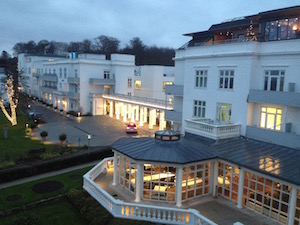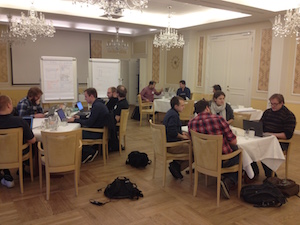HIPERFIT Workshop

2014 HIPERFIT Workshop for Partners and Faculty
On December 10, 2014, HIPERFIT is hosting a workshop for HIPERFIT partners and faculty. At the workshop, HIPERFIT faculty and PhD students will present the latest developments in the various HIPERFIT project developments. The workshop also offers HIPERFIT partners the possibility to present opportunities for involving HIPERFIT researchers in obstacles encountered by the partners with respect to high-performance computational problems in the finance domain. A separate session is therefore devoted to partners for presenting such encounters in the finance industry.
The Venue
Kurhotel Skodsborg, Skodsborg Strandvej 139, 2942 Skodsborg (45585800)
Schedule December 10, 2014

- 08:30
- Breakfast served
- 08:55
- Welcome (Fritz Henglein)
- 09:00
- Compiling for Parallel Computations (Chair: Ken Friis Larsen)
- Futhark - An Array Language for Data-parallel Execution (Troels Henriksen, DIKU)
- Streaming Nested Data Parallelism (Frederik Meisner Madsen, DIKU)
- Compiling APL for Data-Parallel Execution through a Typed Intermediate Language (Martin Dybdal, DIKU)
- 10:15
- Break
- 10:30
- Industry Input (Chair: Fritz Henglein)
- The MC2 Challenge in Risk (Carl Balslev Clausen, SimCorp)
- Big Data and Advanced Analytics in a Financial Institution (Nadeem Gulzar, Danske Bank) CANCELLED
- "Carry that Load" — Risk-minimization in Electricity Markets (Martin Jönsson, IMF)
- 11:30
- Break
- 11:45
- Bohrium and Big-data (Chair: Brian Vinter)
- Bohrium - Bridging High Performance and High Productivity (Kenneth Skovhede, NBI)
- Effective Interoperability (Simon Lund, NBI)
- Transactional Partitioning: A New Abstraction for Main-memory Databases (Vivek Shah, DIKU)
- 13:00
- Lunch
- 14:00
- Household Finance and Risk Management (Chair: Mogens Steffensen)
- Household Finance Problems approached by Numerical Methods (Mai-Britt Nordfang, IMF)
- Rethinking Exchange Rate Risk Management (Rolf Poulsen, IMF)
- Calibration of the Local Volatility Function (Lykke Rasmussen, IMF) CANCELLED
- 15:15
- Break
- 15:30
- Financial Contracts and Valuation (Chair: Andrzej Filinski)
- A Prototype Framework for Parallel Valuation and Risk Calculation (Martin Elsman, DIKU)
- Certified Management of Financial Contracts (Patrick Bahr, DIKU)
- Financial Benchmarks for GPGPU Compilation (Cosmin Oancea, DIKU)
- 16:45
- Thanks - feedback
- 17:15
- Chat and a drink
- 18:30
- Dinner

A table of participants for the workshop on December 10, and for the discussion and planning sessions (HIPERFIT staff only) on December 11, appears below. The schedule for December 11 appears at the very end of the page.
Participation in the workshop is by invitation only, but please contact the HIPERFIT management if you think you should have received an invitation.
As always, please visit http://www.hiperfit.dk for news and information about published papers, our Tuesday lunch meetings, and news in general from the HIPERFIT research center.
Abstracts
09:00-10:15 Compiling for Parallel Computations
Futhark - An Array Language for Data-parallel Execution (Troels Henriksen)
Compiling real-world applications to efficient parallel code, especially when targeting many-core hardware, requires an optimiser and code generator that can exploit a combination of high-level invariants and low-level optimisations. We present a purely functional core language, named Futhark, intended as a compilation target for higher-level languages, that supports nested map-reduce parallelism on regular array, but also a set of “imperative” constructs, such as in-place updates and do-loops. We also report in-progress work on the Futhark optimizing compiler, which is thought to allow a gradual transformation of the program, within the same representation, towards low-level, imperative-like code, which can then be efficiently and straightforwardly translated to the parallel assembly languages of our time, such as CUDA and OpenMP.
Streaming Nested Data Parallelism (Frederik Meisner Madsen)
A clever compiler relieves the programmer from many technical details, facilitating rapid development, code re-use and hopefully high performance. If the compiler obeys a simple optimistic time-space cost model, the hope becomes a guarantee. This talk aims to identify two key challenges related to functional data-parallel language design and costing: Nested data-parallelism and excessive space usage when too few processors are available. To solve these challenges, a language based on first-class sequences and dataflow execution is presented. The language supports nested data parallelism, obeys a time-space cost model and can run on many different architectures including single-core machines and GPGPUs. Experiments show promising results compared to similar languages, and the ideas are currently being implemented in the next release of Accelerate, a Haskell library for data-parallel execution on GPGPUs.
Compiling APL for Data-parallel Execution through a Typed Intermediate Language (Martin Dybdal)
We present a compiler for a subset of the classical array programming language APL. The compiler translates APL programs into a typed array intermediate language, called TAIL, which is equipped with a clear type system and an operational semantics. We demonstrate, for a few benchmarks, the feasibility of compiling TAIL further into code that can execute on parallel architectures, such as GPGPUs.
10:30-11:30 Industry Input
The MC2 Challenge in Risk (Carl Balslev Clausen, SimCorp)
Monte Carlo methods are required for precise valuation of contracts that have a certain level of complexity. Monte Carlo methods are also required for various Risk calculations when large shocks and movements are modelled. Combining Monte Carlo Risk with Monte Carlo valuation we encounter the double Monte Carlo challenge, aka the MC2 challenge. We report on specific use cases and benchmarks from the industry.
Big Data and Advanced Analytics in a Financial Institution (Nadeem Gulzar, Danske Bank) CANCELLED
In Danske Bank a lot of effort is being put into utilizing new sources of data (social, weblogs, etc.) to gain a better understanding of the customers and their behavior. To handle and process the extremely large amount of data, we require an equally large amount of processing power. There are many ways to address this ranging from using lots of cash to optimizing techniques, etc.
“Carry that Load” — Risk-minimization in Electricity Markets (Martin Jönsson, IMF)
In this talk we look at a specific hedging problem of a contract in the derivatives market for power contracts. We suggest a simple hedging approach that relies on expected loss minimisation of our hedged position, and to calculate our optimal hedge we suggest a simple model for the spot price and consumption of electricity. We test our approach on empirical data obtained from an energy trading company, and compare our strategy to the hedging approach currently used by the company.
11:45-13:00 Bohrium and Big-data
Bohrium - Bridging High Performance and High Productivity (Kenneth Skovhede)
In this talk I introduce the Bohrium runtime system and show how it simultaneously enables rapid development and high performance execution. I then summarize our current results with the Bohrium approach for CPU, GPGPU and cluster execution. Finally I present the state of my current work on FPGA execution in Bohrium.
Effective Interoperability (Simon Lund)
Programming languages and models are essential building blocks for computer-based problem-solving. The general challenge is about modeling concepts and abstractions for a given problem and expressing it programmatically to obtain a solution. A challenge that no single programming model or language can solve for the general case when put under the constraint of also efficiently utilizing hardware. However, many languages and models exist which solves classes of problems efficiently. Interoperability provides the means of combining them. In this talk, this approach is exemplified through the use of the emerging parallel programming language Chapel and the long-lived productivity language Python. The interoperability approach is exemplified by introducing Chapel and comparing strengths/weaknesses of the two languages and how to overcome them through the use of interoperability.
Transactional Partitioning: A New Abstraction for Main-memory Databases (Vivek Shah)
Online Transaction Processing (OLTP) applications are making new demands from OLTP databases on variety, performance and application cost frontiers. Existing programming models provided by current OLTP databases do not meet all the demands of these classes of applications. The talk presents a new programming model (transactional partitioning) that needs to be targetted by OLTP databases (especially main-memory databases) that would allow them to meet these new application demands. The talk also outlines the challenges and their possible solutions that are being investigated while building the prototype system.
14:00-15:15 Household Finance and Risk Management
Household Finance Problems approached by Numerical Methods (Maj-Britt Nordfang)
Closed-form solutions to mathematical financial problems can only be obtained when various strict assumptions are met. As a consequence, the problems where explicit closed-form solutions exist are usually highly stylized. In this talk I will present a particular problem related to the financial decisions of individual households that cannot be solved on closed form and discuss numerical approaches to finding the solution.
Rethinking Exchange Rate Risk Management (Rolf Poulsen)
We describe some theoretical and practical (from computational to legal) issues in the construction of an exchange-rate risk management system that is feasible for small to medium enterprises. This work is a collaboration with http://www.gcureports.com/ and you will hear how the system was almost endorsed by the Pope.
Calibration of the local volatility function (Lykke Rasmussen) CANCELLED
In this talk we present the results of a study and comparison of 5 different methods for calibrating local volatility functions.
15:30-16:45 Financial Contracts and Valuation
A Prototype Framework for Parallel Valuation and Risk Calculation (Martin Elsman)
We give an overview of a simple open architecture and framework for demonstrating parallel execution of contract and portfolio valuation, as well as risk calculations. The framework, which is open source, builds on a contract language for specifying and managing multi-party contracts and on an efficient parallel pricing engine.
Certified Management of Financial Contracts (Patrick Bahr)
We present a contract language for describing complex financial contracts. Contracts modelled in our language are analysed and transformed for management according to a precise cash-flow semantics, formalised and verified using the Coq proof assistant.
Financial Benchmarks for GPGPU Compilation (Cosmin Oancea)
We present three studies of array-based applications from the financial domain, all suitable for GPGPU execution. The studies have resulted in three concrete application benchmarks for which the available parallelism is described by nested map-reduce functional combinators. We also describe the influence of the invariants and code transformations that govern the main trade-offs of the rich, dataset-sensitive optimisation space. The application benchmarks targets both CPUs and GPGPUs and we provide useful insight into the language constructs and compiler infrastructure capable of expressing and optimising such applications.
Participants
| Name | Dec 10 | Dinner Dec 10 | Dec 11 | Room |
|---|---|---|---|---|
| Andrzej Filinski (DIKU) | 1 | 1 | 1 | 1 |
| Brian Vinter (NBI) | 1 | 1 | 1 | 1 |
| Cosmin Oancea (DIKU) | 0 | 1 | 1 | 1 |
| Danil Annenkov (DIKU) | 1 | 1 | 1 | 1 |
| Frederik Meisner Madsen (DIKU) | 1 | 1 | 1 | 1 |
| Fritz Henglein (DIKU) | 1 | 1 | 1 | 1 |
| James Avery (NBI) | 1 | 1 | 1 | 1 |
| Jost Berthold (DIKU) | 1 | 1 | 1 | 1 |
| Ken Friis Larsen (DIKU) | 1 | 0 | 1 | 0 |
| Kenneth Skovhede (NBI) | 1 | 1 | 1 | 1 |
| Lykke Rasmussen (IMF) | 0 | 0 | 0 | 0 |
| Mads R. B. Kristensen (NBI) | 1 | 1 | 1 | 1 |
| Maj-Britt Nordfang (IMF) | 1 | 1 | 1 | 1 |
| Marcos Vaz Salles (DIKU) | 1 | 1 | 0 | 0 |
| Martin Dybdal (DIKU) | 1 | 1 | 1 | 1 |
| Martin Elsman (DIKU) | 1 | 1 | 1 | 1 |
| Martin Jönsson (IMF) | 1 | 1 | 0 | 0 |
| Mogens Steffensen (IMF) | 1 | 1 | 1 | 0 |
| Oleksandr Shturmov (DIKU) | 1 | 1 | 1 | 0 |
| Patrick Bahr (DIKU) | 1 | 1 | 1 | 1 |
| Rolf Poulsen (IMF) | 1 | 1 | 1 | 1 |
| Simon Ellersgaard (IMF) | 0 | 0 | 0 | 0 |
| Simon Lund (NBI) | 1 | 1 | 1 | 1 |
| Thomas Jensen (DIKU) | 1 | 0 | 0 | 0 |
| Troels Blum (NBI) | 0 | 0 | 0 | 0 |
| Troels Henriksen (DIKU) | 1 | 1 | 1 | 1 |
| Vivek Shah (DIKU) | 1 | 1 | 0 | 0 |
| Anette Broløs (CFIR) | 1 | 1 | 0 | 0 |
| Anders Pall Skött (CFIR) | 1 | 0 | 0 | 0 |
| Christian Hjersing (SimCorp) | 1 | 0 | 0 | 0 |
| Jens Ehlers (SimCorp) | 1 | 1 | 0 | 0 |
| Carl Balslev Clausen (SimCorp) | 1 | 1 | 0 | 0 |
| Henrik Nygaard Jensen (Danske Bank) | 1 | 1 | 0 | 0 |
| Nadeem Gulzar (Danske Bank) ILL | 0 | 0 | 0 | 0 |
| Uwe Heissner (Nordea) | 1 | 0 | 0 | 0 |
| Manuel Torrealba (Nordea) | 1 | 0 | 0 | 0 |
| Total | 31 | 26 | 20 | 17 |
Schedule December 11, 2014 (HIPERFIT staff only)
On December 11, 2014, HIPERFIT staff will meet and discuss feedback and plan future activities and projects within HIPERFIT. Here is a draft schedule.
- 08:30
- Breakfast served
- 08:55
- Outline for the day (Plenum)
- 09:00
- Session 1 (Groups)
- 12:00
- Lunch
- 13:00
- Session 2 (Groups)
- 15:00
- Break
- 15:15
- Group Presentations (Plenum)
- 16:30
- End
 HIPERFIT
HIPERFIT